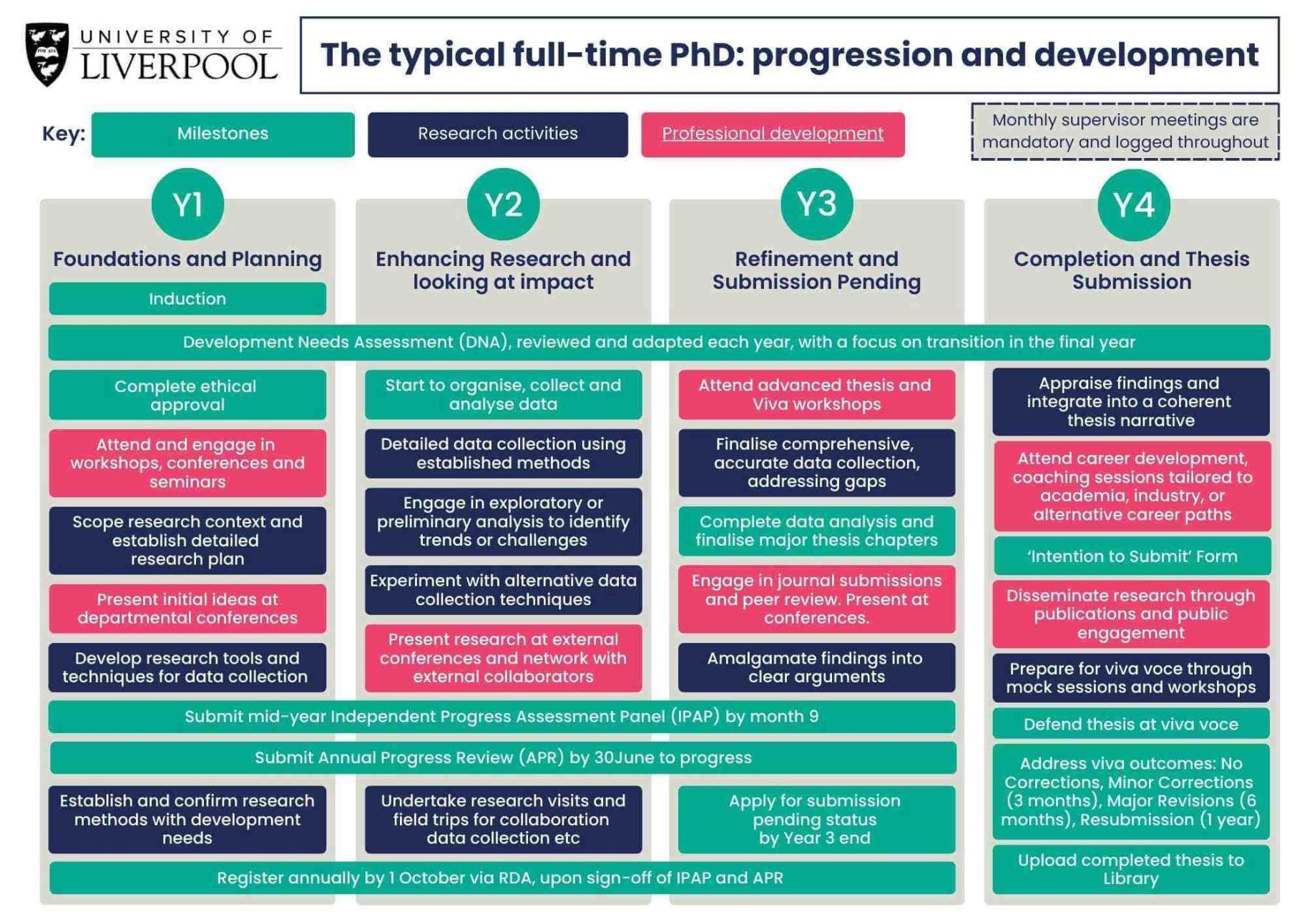 Download the typical full-time PhD Progression and Development infographic
Download the typical full-time PhD Progression and Development infographic

Text-only version of 'The typical full-time PhD: progression and development' infographic
Key:
M denotes a milestone
R denotes Research activities
P denotes Professional development
Note: Monthly supervisor meetings are mandatory and logged throughout
Year 1
Foundations and Planning
- Induction (M)
- Development Needs Assessment (DNA), reviewed and adapted each year, with a focus on transition in the final year (this runs across all years shown on the infographic) (M)
- Complete ethical approval (M)
- Attend and engage in workshops, conferences and seminars (P)
- Scope research context and establish detailed research plan (R)
- Present initial ideas at departmental conferences (P)
- Develop research tools and techniques for data collection (R)
- Submit mid-year Independent Progress Assessment Panel (IPAP) by month 9 (M)
- Submit Annual Progress Review (APR) by 30June to progress (M)
- Establish and confirm research methods with development needs (R)
- Register annually by 1 October via RDA, upon sign-off of IPAP and APR (M)
Year 2
Enhancing Research and looking at impact
- Development Needs Assessment (DNA), reviewed and adapted each year, with a focus on transition in the final year (this runs across all years shown on the infographic) (M)
- Start to organise, collect and analyse data (M)
- Detailed data collection using established methods (R)
- Engage in exploratory or preliminary analysis to identify trends or challenges (R)
- Experiment with alternative data collection techniques (R)
- Present research at external conferences and network with external collaborators (P)
- Submit mid-year Independent Progress Assessment Panel (IPAP) by month 9 (M)
- Submit Annual Progress Review (APR) by 30June to progress (M)
- Undertake research visits and field trips for collaboration data collection etc (R)
- Register annually by 1 October via RDA, upon sign-off of IPAP and APR (M)
Year 3
Refinement and Submission Pending
- Development Needs Assessment (DNA), reviewed and adapted each year, with a focus on transition in the final year (this runs across all years shown on the infographic) (M)
- Attend advanced thesis and Viva workshops (P)
- Finalise comprehensive, accurate data collection, addressing gaps (R)
- Complete data analysis and finalise major thesis chapters (M)
- Engage in journal submissions and peer review. Present at conferences (P)
- Amalgamate findings into clear arguments (R)
- Submit mid-year Independent Progress Assessment Panel (IPAP) by month 9 (M)
- Submit Annual Progress Review (APR) by 30June to progress (M)
- Apply for submission pending status by Year 3 end (M)
- Register annually by 1 October via RDA, upon sign-off of IPAP and APR (M)
Year 4
Completion and Thesis Submission
- Development Needs Assessment (DNA), reviewed and adapted each year, with a focus on transition in the final year (this runs across all years shown on the infographic) (M)
- Appraise findings and integrate into a coherent thesis narrative (R)
- Attend career development, coaching sessions tailored to academia, industry, or alternative career paths (P)
- ‘Intention to Submit’ Form (M)
- Disseminate research through publications and public engagement (P)
- Prepare for viva voce through mock sessions and workshops (R)
- Defend thesis at viva voce (M)
- Address viva outcomes: No Corrections, Minor Corrections (3 months), Major Revisions (6 months), Resubmission (1 year) (M)
- Upload completed thesis to Library (M)